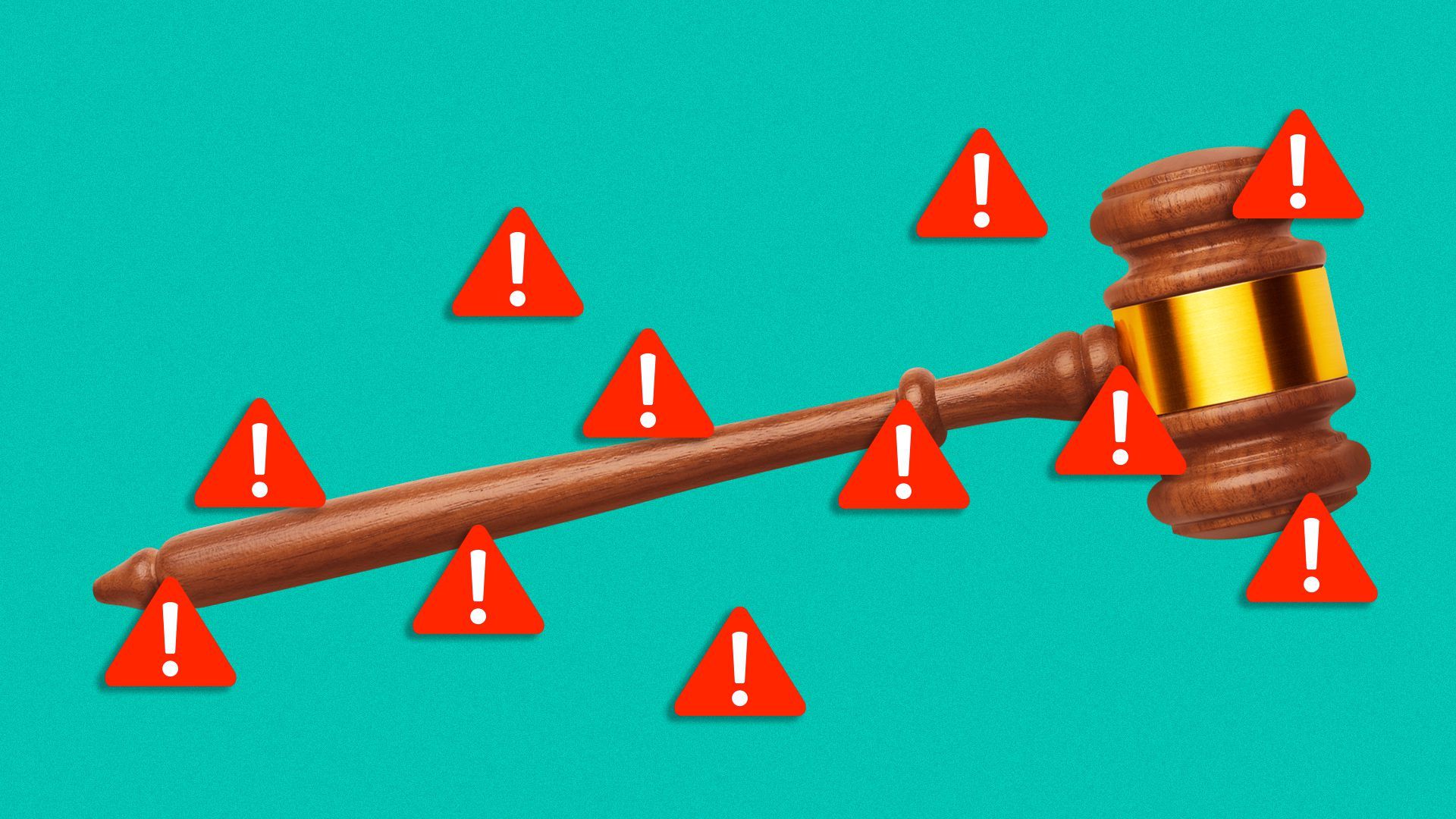
Illustration: Aïda Amer/Axios
Tech firms are warning the Supreme Court that weakening liability protections for online speech could put all types of service providers — including those operating offline — at risk of costly, business-wrecking litigation.
The big picture: A key law governing online speech is facing its first-ever fundamental tests before the high court.
Driving the news: Companies and parties to the suits made early filings and statements this week in two cases that will test long-held practices in the tech industry based on Section 230 of the Communications Decency Act, which largely protects platforms from liability for people’s posts.
- Twitter, Inc. vs. Taamneh asks whether platforms can be held to violate anti-terrorism laws if they have policies against pro-terrorist content but fail to remove all such messages. Twitter, Meta and Google filed briefs in the case this week.
- In Gonzalez v. Google, relatives of victims of an ISIS attack are suing Google-owned YouTube for allegedly helping turn viewers into terrorists. The court must decide whether Section 230’s protections apply to the algorithms that YouTube and other platforms use to select what content to show users.
- Justice Clarence Thomas has suggested the court place new limits on the reach of Section 230.
Details: In the Taamneh case, attorneys for Twitter, Google and Meta argue that businesses like rental-car companies or banks would also risk legal liability for terrorist attacks if a jury decides they could have done more to root out terrorists using their services.
- “By eviscerating any meaningful limitation on aiding-and-abetting liability, it threatens a multitude of third parties with liability and public opprobrium for heinous acts of terrorism that they never knew about, much less supported, and in fact adamantly opposed,” Twitter’s attorneys write in the Taamneh brief.
- Policy analysts from the Bipartisan Policy Center, a think tank in Washington, wrote in a brief, “If the Court rules in the plaintiff’s favor, then despite [Twitter’s] ongoing work to prevent most terrorist content from its site, mishandling of this kind would lead to lawsuits.”
In the Gonzalez case, plaintiffs argue that Section 230’s protection does not extend to algorithmically created recommendations, since YouTube plays a role in deciding which videos to recommend to users. Google contends Section 230 protects YouTube’s methods of organizing users’ posts, and weakening the law would only make it harder to filter out terrorism content.
- “Through the years, YouTube has invested in technology, teams, and policies to identify and remove extremist content,” José Castañeda, a Google spokesperson, told Axios. “Undercutting Section 230 would make it harder, not easier, to combat harmful content — making the internet less safe and less helpful for all of us.”
What they’re saying: The Gonzalez case “has a very high potential impact with a very small amount of decision makers involved, which makes it a particularly intense decision point,” Emma Llansó, director of the Free Expression Project at the Center for Democracy & Technology, told Axios.
- Both cases have the potential to impact businesses far beyond tech platforms, she said.
The intrigue: Twitter’s defense of its legal immunity and ability to moderate comes as its new owner, Elon Musk, has been rapidly shifting the platform’s content policy, promoting what he describes as free speech and reinstating banned users.
- Musk has also been shedding staff on the policy and trust and safety teams, causing experts to question how thoroughly Twitter will now be able to enforce its policies.
- “The legal pillars that helped the internet grow are the same ones that would allow Musk to implement many of the reforms he has suggested. But those pillars are under threat,” James Romoser, editor of SCOTUSblog, wrote earlier this month.
- “[Musk] has enormous leeway to kind of do whatever he wants, and is acting on that, assuming that the legal framework [of Section 230] is solid and will persist,” said Llansó. “These cases are showing that here in the U.S., that’s definitely being called into question.”
What’s next: Google will file a formal reply in the Gonzalez case by mid-January, with arguments likely happening early next year. Amicus briefs from interested third parties are due in both cases in coming weeks.


